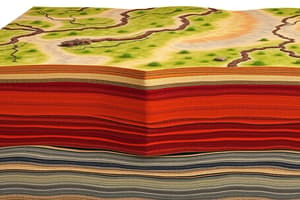Podcast
Questions and Answers
What is the primary method scientists use to study Earth's internal structure?
What is the primary method scientists use to study Earth's internal structure?
- Observing weather patterns
- Analyzing rock samples from the surface
- Measuring seismic wave travel time (correct)
- Studying volcanic activity
Who discovered the Mohorovicic discontinuity?
Who discovered the Mohorovicic discontinuity?
- Andrija Mohorovicic (correct)
- Inge Lehmann
- Beno Gutenberg
- John William Strutt
What characteristic of S-waves explains the existence of a shadow zone?
What characteristic of S-waves explains the existence of a shadow zone?
- S-waves can travel through liquids.
- S-waves are faster than P-waves.
- S-waves have a longer wavelength than P-waves.
- S-waves do not travel through liquids. (correct)
The boundary between the mantle and outer core is known as what?
The boundary between the mantle and outer core is known as what?
What observation about S-waves is significant for understanding the Earth's structure?
What observation about S-waves is significant for understanding the Earth's structure?
What major discovery is attributed to Inge Lehmann?
What major discovery is attributed to Inge Lehmann?
Why do P-waves bend when passing through different materials within the Earth?
Why do P-waves bend when passing through different materials within the Earth?
What is one method used to determine the size of Earth's inner core?
What is one method used to determine the size of Earth's inner core?
What is the main function of body waves in seismic studies?
What is the main function of body waves in seismic studies?
Which layer of the Earth lies directly above the outer core?
Which layer of the Earth lies directly above the outer core?
Which type of seismic wave is known to travel through both solids and liquids?
Which type of seismic wave is known to travel through both solids and liquids?
Where is the epicenter located in relation to the focus of an earthquake?
Where is the epicenter located in relation to the focus of an earthquake?
What movement characterizes S-waves during their propagation?
What movement characterizes S-waves during their propagation?
Which wave is known to cause the most significant damage during an earthquake?
Which wave is known to cause the most significant damage during an earthquake?
What is the Mohorovicic Discontinuity associated with?
What is the Mohorovicic Discontinuity associated with?
How do surface waves primarily differ from body waves?
How do surface waves primarily differ from body waves?
What type of seismic wave is the primary wave (P-wave) known for?
What type of seismic wave is the primary wave (P-wave) known for?
What is the focus of an earthquake?
What is the focus of an earthquake?
Flashcards are hidden until you start studying
Study Notes
Layers of the Earth
- Earth is structured in four main layers: Crust, Mantle, Outer Core, Inner Core.
Seismic Waves
- Seismic waves are energy waves generated by the sudden release of energy from the Earth's focus, radiating in all directions.
- The focus is where an earthquake originates, while the epicenter is directly above it on the Earth's surface.
Types of Seismic Waves
- Two primary types of seismic waves are Body Waves and Surface Waves.
Body Waves
- Body Waves travel through Earth's interior and are essential for studying its internal structure.
- Body Waves are subdivided into P-waves and S-waves.
P-waves (Primary Waves)
- P-waves are fast-moving compressional waves that can travel through solids, liquids, and gases.
- They cause particles to vibrate parallel to the wave's direction and arrive first at seismic detectors.
S-waves (Secondary Waves)
- S-waves are slower than P-waves, only traveling through solids, and move in a transverse manner.
- Their inability to travel through liquids helps scientists deduce that the outer core is liquid.
Surface Waves
- Surface Waves travel along the Earth’s surface and are divided into Love Waves and Rayleigh Waves.
Love Waves
- Love Waves move ground horizontally in a side-to-side motion, causing significant structural damage during earthquakes.
Rayleigh Waves
- Rayleigh Waves roll along the ground like ocean waves, causing up-and-down and side-to-side motion, contributing to most felt shaking during an earthquake.
Earth’s Internal Structure
- Scientists analyze seismic wave travel times to understand Earth's internal structure, noting that P-waves reach detectors before S-waves due to their higher speed.
Mohorovicic Discontinuity
- Discovered by Andrija Mohorovicic in 1909, the Mohorovicic Discontinuity exists about 50 km below the surface, marking a velocity change in seismic waves, indicating a density difference between the crust and mantle.
Gutenberg Discontinuity
- The Gutenberg Discontinuity designates the boundary between the Earth's mantle and outer core, explained by the presence of a shadow zone for P-waves, indicating different materials.
Additional Insights
- S-waves are detected up to 103 degrees from the epicenter, beyond which they do not propagate, suggesting a liquid portion within the Earth, indicating the presence of a liquid outer core.
- Inge Lehmann postulated the existence of a solid inner core in 1936, based on seismic reflections within the core.
- The inner core is solid and denser than the surrounding material, with its size determined through nuclear underground tests and seismic wave echoes.
Studying That Suits You
Use AI to generate personalized quizzes and flashcards to suit your learning preferences.




